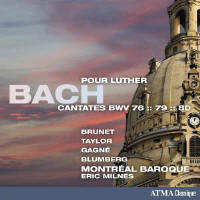Texte paru dans: / Appeared in: |
|
|
Outil de traduction ~ (Très approximatif) |
|
|
Reviewer: J.
F. Weber
Along with Graham Ross
(Fanfare 41:4), Rudolf Lutz (41:6), and the forthcoming Philippe Herreweghe,
we have four newly issued couplings of the two Reformation cantatas
observing the quincentenary of Luther’s posting of his 95 theses, the
opening salvo in the theological conflict that led to the Reformation and
the enduring division of Western Christianity. Both were written for the
October 31 celebration, one (BWV 80) in 1723, the other (BWV 79) in 1725.
But BWV 76, first sung on June 6, 1723, is connected to the event, too, for
its second part was sung at St. Paul’s in Leipzig for the Reformation
celebration several times, so it completes this program better, arguably,
than any other filler. Ross has a miscellaneous bunch of fillers, Lutz has
BWV 24, and Herreweghe has the popular Easter cantata, BWV 4. One aspect of the performances makes this disc unique. Only four singers are involved, so they sing a total of nine choruses and chorales one voice to a part. For the concluding chorales, at least, this loses the sense of congregational participation that is so important in Lutheran worship. The lack is most evident in the finale to BWV 79; placed at the end of Lutz’s program, it provides a rousing conclusion that is not notable here in the middle of the sequence. Note also the aria chorale in BWV 80, where here is heard a solo bass on the chorale and a soprano in the aria.
But this is nothing new for
Eric Milnes, who has already given us seven CDs in an ongoing series of Bach
cantatas. In the first seven reviews (29:6 to 40:2), my two colleagues have
been pretty plain-spoken about this adoption of Joshua Rifkin’s theory that
Bach’s sacred music is sung one voice to a part. I even defended Rifkin when
I was asked to offer a foil to the original review of his Mass in B Minor
(6:3 and 6:6), and my colleagues have acknowledged that it is one way of
hearing the sacred works. In addition to recordings by Rifkin and Milnes,
Bach cantatas one-to-a-part have also come to us on a score of discs from
Sigismund Kuijken, most of them on Accent. At the rate Milnes is going (24
cantatas on eight discs in 14 years), he would complete his survey around
the year 2118. Milnes has fine singers and players clearly recorded, so quality is not the issue. His fine players tend to dominate the texture, not what I look for in vocal/choral music. The tempos are lively, as expected, though Lutz’s total time of BWV 80 is the same and his BWV 79 is a minute faster. Milnes does have a generous filler. I prefer Lutz as the real competitor to this disc, but Milnes does credit to the Rifkin approach. | |
|
|
|
|
Cliquez l'un ou l'autre
bouton pour découvrir bien d'autres critiques de CD |
|




